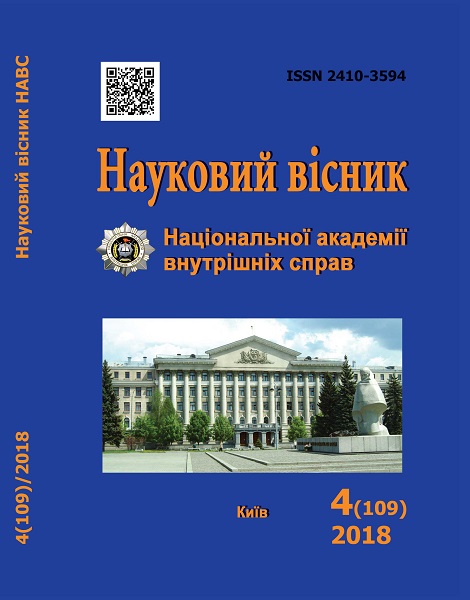Features of the Interpretation of Certain Categories of Criminology
Abstract
The article deals with the peculiarities of the interpretation of the conceptual apparatus of science of criminology, in particular concerning the subject of criminology, its connection, synthesis with the definitions of the science of criminal law. Criminology needs a kind of scientific instrument that serves it, that is, its conceptual apparatus. Criminological concepts are a reflection of the most significant means and relations, phenomena, processes, as constituent of crime, and interacting with crime. Under this interaction, as well as interaction in general, the dialectic state of «cooperation» and «confrontation» is understood. That is, on the one hand, it is a favor, and on the other – the fight against crime. Hence, the complex composition of the conceptual apparatus of criminology, which has developed today due to involuntary «sponsorship» of jurisprudence, sociology, philosophy, psychology, economics, statistics and other sciences. Such a large number of notions of non -legal origin in criminology conceals the danger of the destruction of the mechanism of legal assessments and conclusions about crime, its causes, the identity of the offender, measures to prevent crime and the significance of criminological knowledge to «ordinary» national education, but not to scientific substantiation of the application of legal and non-legal measures of preventive influence on the causes of crime. The sociological stratification of the conceptual apparatus of criminology, for example, provides a basis for the scientific substantiation of the orientation of the police on the excessively wide coverage of the content of educational and preventive activities, including the fact that it does not act as a police officer as an armed law enforcement agency (we recall the employment of people who returned from places of deprivation of liberty, treatment of alcoholics, drug addicts, control over adherence to trade rules, participation in work with mentally ill, etc.). Therefore, in studying criminology, the application of criminological knowledge, the student should be guided by the legal significance of problems related to crime. Social problems, no matter how important they are to society, require the development of social but not criminological measures, that is, those that are reduced to very important tasks. Criminology studies facts and phenomena of a legal nature: crime, crimes, criminals, persons who have committed crimes, victims of criminal encroachment, legal and illegal means of preventive influence on the causes and conditions of crime, crime. However, the criminological approach to the criteria for assessing the elements of these factors and phenomena is not adequate to the criminal-law approach. Although both criminal law and criminology are ultimately aimed at ensuring law and order through the prevention of crime and the preventive effect in general on crime. In contrast to the criminal -law concepts that determine the guilt and punishment through the legal assessment of the elements of the act, the objectives of the criminological concepts are to establish the causes of these elements and hence – measures of preventive influence on them.
Downloads
Abstract views: 122 PDF Downloads: 44
- Authors reserve the right to authorship of their own work and transfer to the magazine the right of the first publication of this work under the terms of the Creative Commons Attribution License, which allows other persons to freely distribute published work with mandatory reference to authors of the original work and the first publication of an article in this magazine.
- Authors have the right to enter into separate additional agreements on non-exclusive dissemination of the work in the form in which it was published in the journal (for example, to post an article in the institution's repository or to publish as part of a monograph), provided that the link to the first publication of the work in this journal is maintained.
- The journal's policy allows and encourages the posting of articles by authors on the Internet (for example, in electronic storehouses of institutions or on personal websites), both before the submission of this manuscript to the editorial office and during its editorial processing, as this contributes to the creation of a productive scientific discussion and positively affects the efficiency and dynamics of citing the published work.




